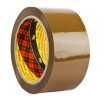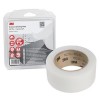Can insulating tape withstand heat? The excellent properties of this product
Can electrical tape withstand heat? When using a product at a professional level, it is essential to know all its key features.
It goes without saying, then, that a company which uses strong double-sided adhesive tape will be interested on the maximum holding capacity of its industrial double-sided adhesive, that the canning personnel will need to know the various resistance level of packaging tape, that a painter must know how long masking tape can be applied without leaving any residue, and so on.
In the case of electrical tape, in fact, the question is, if possible, even more delicate. As it is well known, in fact, these adhesive tape rolls have a very precise objective: this is not adhesive which must be glued down to seal or to mask something, but they are instead needed to isolate electrical elements in an effective and safe manner.
And when electricity is involved, with all the risks that electrical systems can cause, it really is best not to take it lightly, especially knowing that an electrical device can be a trigger and therefore a cause a fire.
Hence the question: can insulating tape withstand heat? And how would it behave in case a free flame? In this article we will answer all of these questions.
Insulating tape, a summary
Before outlining if and how much insulating tape can withstand heat, let’s briefly review what the peculiarities of this tool, always present in the toolbox of any electrician, are.
Insulating tape has many different characteristics compared to other adhesives: first of all, it offers a high level of insulation, thanks to its extremely low electrical conductivity.
All other peculiarities of this double-sided tape are always in service of allowing efficient insulation. It is in fact an industrial double-sided adhesive tape with a strong elasticity, which can therefore be “pulled” before its application to ensure an optimal seal, as well as a perfect adhesion to the surface to be insulated.
All this is possible thanks to an elastic PVC support, which guarantees quick and easy taping operations.
But what could happen when tape is exposed to high temperatures? The causes could be many and different: overheating of a device, the concentration of sunlight on a taped wire, the start of a fire, and so on.
How would insulating tape behave in such situations?
Can electrical tape withstand heat?
As it has been described, insulating tape is designed above all with the aim of offering high electrical insulation. However, it so happens that this tape can be exposed exceptionally even to high and abnormal temperatures.
But how many degrees can standard insulation tape withstand without any modification? The range hovers at about 60 °C (140 °F), with particular insulation models being able to withstand temperatures even up to 80 °C (176 °F).
The important fact, however, is that PVC insulation tape is self-extinguishing. This means that, if an insulating tape were exposed to a flame, it would not spread it, not becoming itself a vehicle for the fire.
This therefore means that, in the event of a short circuit, the taped area would not propagate the flame, limiting the damage to a minimum.
And this is the important point to keep in mind when thinking about heat and the risk of fire in relation to insulating tape: unlike other materials and tools, it will not offer flames any additional fuel to propagate themselves.
Adhesive tape and heat
If you need to use double-sided adhesive tape able to be exposed to very high temperatures, insulating tape should not be your first choice, as there are tape rolls designed specifically to resist heat – but obviously not designed to offer thermal insulation, and therefore not suitable, for example, for taping operations.
The typical tape used in the presence of very high temperatures is usually the famous aluminium tape, a product presenting an aluminium support which can withstand a high level of heat radiation.
There are different types of aluminium tape, with different resistance thresholds: these are products which at times can withstand up to 100, 120 or even 150 °C (212, 248, 302 °F) – often also offering a certification for their flame-retardant action.







